Customer Service Teams
Build a Customer Service Dream Team

News of bad customer service reaches more than twice as many ears as praise for good service. With word of mouth spreading like wildfire over social media, your reputation is in customers’ hands.
So how do you ensure customers get the star treatment when they contact support? Zappos CEO Tony Hsieh was talking from experience when he said, “If your is culture right, other stuff like great customer service or building a long-term brand will happen on its own.”
When Zappos shifted focus from selling shoes to pleasing customers, employees became more engaged and passionate, customers were happier, and sales went through the roof. Other customer-service powerhouses such as Amazon (Zappos’ owner since 2009), Google, and, yes, Salesforce have found a winning formula in making culture and brand two sides of the same coin.
Be central to exceptional customer service is the philosophy at the core of everything we’ve done. Every day, every employee works to be better than expected. We strive to wow our customers through amazing service while perfecting the experiences they have with us. The basic principles below have contributed to our success, guiding our teams to be the best at what they do.

Empower employees.
Our team members are hired with the expectation that they will work in the best interest of our customers. Everyone is given the tools and authority to make decisions.
Create trust.
There’s no finish line when it comes to building trust with employees, customers, and partners. Honesty, transparency, and accountability are the guideposts for every decision and action we take in delivering quality customer service.
Dream big.
Unbounded imagination, genuine passion, and the right attitude will take us to the wonderful places we want to go. We aspire to make the impossible possible.
Hire motivated employees.
Why are you in customer service?
Always ask this first. Customer service is not just resolving one issue after another. It’s satisfying customers’' needs, putting smiles on their faces, and inspiring them to do the same for others. Employees who excel have a natural desire to help and express genuine empathy. Bonus points go for a sunny disposition and willingness to go the extra mile.
Are you familiar with what we do?
Ideal candidates walk into interviews with a basic understanding of your company. Have them list what they believe to be the value of your product or service. Fill in any blanks and discuss how you make a difference in customers’ personal or professional lives.
How would you handle …?
Personality is part of the hiring game. To see if a candidate has what it takes, create a customer support scenario. Don’t be afraid to throw a few curveballs. Is the candidate empathetic? Asking appropriate questions? Being proactive? Did you feel the issue was resolved? Provide feedback and give candidates the chance to talk about what they do differently.
Attitude is the the foundation of good culture and outstanding customer service, the driving force behind:
What your employees say and how they say it
The service goals your employees set for themselves
How much your employees are willing to do for your customers
Overall job satisfaction
All skills being equal, employees with the right attitude have an easier time fitting in and performing well on the job. They also tend to stick around longer. To identify strong candidates and weed out those only looking to collect a paycheck, ask questions that align with your core values.
In the end, you’re looking for a good blend of operational and personal skills. Here’s a simple checklist to have on hand for interviews:
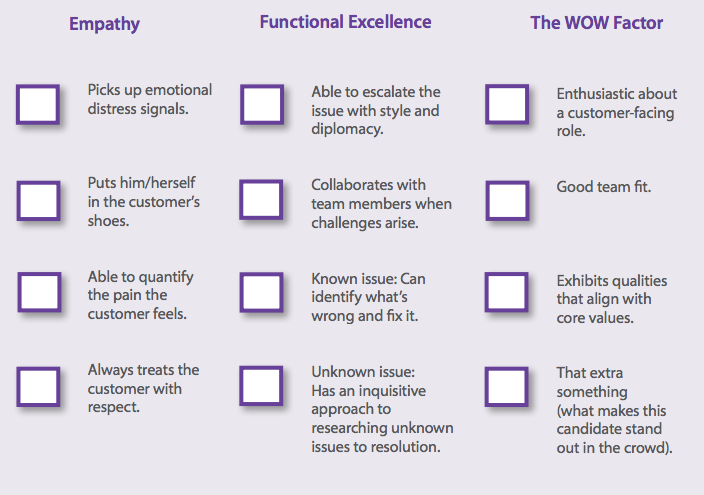
They’ve got the will, you train the skill.
An essential lesson: Always deliver more than expected. This philosophy, inspired by Google Founder Larry Page, is the key to earning customer loyalty and referrals.
Consistently being better than expected is what breeds customer advocacy and brand evangelism. It means proactively reaching out to customers and find ways to help them be more successful. You know you’re doing the job right when customers say, “I expected that.”
Your new and long-term agents can stand out by going the extra mile. Here are 10 ways to do just that:
1. Always follow up.
Checking back in with customers isn’t just good manners. It gives you another opportunity to build the relationship.
2. Listen to the customer.
There’s nothing like talking to a support agent who really listens on all cylinders. Take time to understand issues and how they affect the customer’s business. When people know you value their needs, they’re more likely to stay with your brand.
3. Talk among yourselves.
Accept that you’ll never have a perfect grasp of every issue coming into the support centre. Keep up with the big picture by maintaining open lines of communication with your team.
4. Be honest.
Nobody likes being lied to. Customers expect the truth. When you maintain an open dialogue and keep your customers informed at all times, you’ll earn their commitment to your company.
5. Be human.
Robots are cool, but people would rarely choose to have a conversation with one. Show customers you aren’t a machine. At the end of the day, it’s how you make people feel that matters the most.
6. Be empathetic.
Put yourself in customers’ shoes, especially during tough situations. Your empathy will show and they’ll appreciate it.
7. Respond quickly and accurately,
Customers gain confidence when you respond quickly and solve their problems for good. They are more likely to develop an ongoing relationship with your brand when you’re prompt.
8. Value relationships over revenue.
Focus on the success of your customer. Understand pain points and how you can alleviate them. When you make customer success your priority, improving your product, and bottom line follow.
9. Improve as you go.
Seeing the same issues time and again? Dig into what’s unclear and update your knowledge base or FAQ. By clarifying your messaging, you can reduce contacts for many repetitive issues. Be sure to track any drop in service load and share your results.
10. Ask questions.
The more you know, the more likely you are to resolve an issue to the customer’s satisfaction. Don’t hesitate to ask more questions to get all the information you need to recommend alternate solutions and advocate for the customer.
Have a solid game plan.
Shore up your defenses by developing a plan to execute hassle-free, friction-free experiences. What causes friction? Here are eight factors known to drive customers to competitors:
Having to wait too long for an issue to get resolved.
Dealing with broken promises (the company has over promised or under delivered).
Being treated rudely or with suspicion.
Being transferred from agent to agent; having to repeat the issue each time.
Having to check several times to see if an issue is resolved.
Being left in limbo; not knowing what, if anything, has been done to resolve the issue.
Being pushed to buy something, even before a support issue has been resolved.
Finding support centre information unhelpful, incomplete, or outdated.
The importance of customer service.
In a recent customer satisfaction survey, ClickFox reported that 47% of consumers expect a response within 24 hours, 22% expect a response immediately, and 19% expect a response within an hour. Keeping customers happy and resolving their problems are of vital importance: Money talks, and customer dissatisfaction will eventually show up in the bottom line.

Stay on top of your support.
Empower your team to succeed by encouraging them to track cases religiously and treat each one as a priority. Assign every issue a status, level of urgency, and owner.

Know who’s working on what.
A shared dashboard encourages accountability and reduces ambiguity by creating an airtight system to track cases and keep customer conversations in context. At a glance, see which agent is assigned, which cases are still open or pending, and which have been resolved.

Collaborate with your team.
If you don’t have the answer, quickly transfer the customer to someone who does. When you involve your entire team in customer support, you improve the speed and quality of responses.
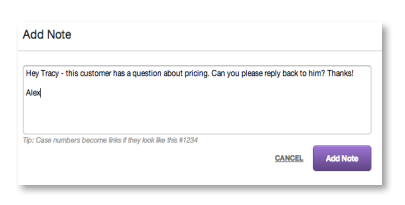
Operate as a cohesive team.
Your system should aim to assign cases based on priority, agent availability, and expertise. A recent survey from American Express found that three in five Americans would try a new brand or company to get a better service experience. To keep them with you, make sure the first person a customer talks to is the most qualified to address the issue at hand.
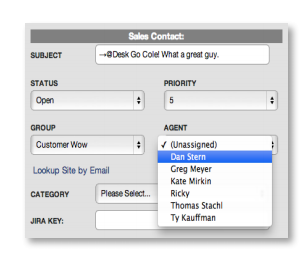
Know about your customers.
Reduce support time by building a profile for each customer, including information about any prior interactions. Agents can use it as a cheat sheet if the customer reaches out, providing immediate attention to the issue and addressing it in a more efficient and personal way.
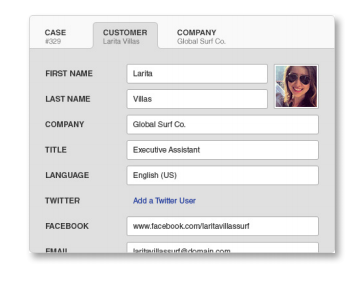
Organise your customer conversations.
How can you label a case that’s both urgent and high priority — for example, from a VIP customer? Create work “queues” or folders to help you organise your cases into categories. Add notes for your team like “more info”; or “call back”
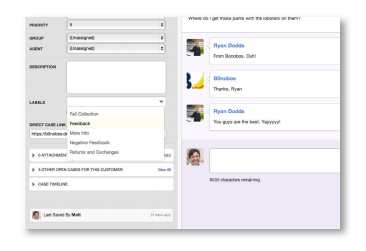
Teamwork Makes the Dream Work
Create opportunities.
Nobody wants to feel stuck in a dead-end job. Job progression keeps agents inspired and motivated, so provide plenty of opportunities for professional growth and promotion. If caseloads allow, consider loaning agents with the interest and aptitude to other departments. It helps keep them engaged while growing their skills and value.
Provide positive feedback.
Employees who receive frequent feedback from management feel they have more control over their work, which increases job satisfaction. Providing feedback is definitely one of the easiest and quickest ways to boost engagement and performance.
Take suggestions.
It’s up to every employee, not just a few people in management, to build and strengthen culture. Ask for suggestions and keep your team involved in helping the business grow and thrive.
Embrace “whole support.”
Stop thinking of customer support as a crew of responsive hole patchers who deal with problems as they arise. Everyone has an opportunity to fill a customer support role. Whole support creates an incredible opportunity to get to know our customers on an intimate level, gaining insight into their needs and their relationship with the product.
Recognise individual talents.
Give rewards tied to specific actions so employees know you sincerely appreciate their efforts. Encourage individuals to use their talents for team success.
Celebrate success.
The level of service you give customers is fundamentally rooted in your staff. When employees are happy and care about doing their jobs, real empowerment happens. There are dozens of ways — big and small — to celebrate personal and team achievements, from parties to thank-you gifts to hoopla in meetings. Do what feels sincere and right for your team.
Conclusion
So how can you take these tips outlined above and make them work for you? The evolution toward becoming customer-centric is both complex and long, but don’t be discouraged. Small changes in policies and processes can help drive transformational change in both thinking and behaviour. All it takes is one step, one change, one right hire, one system, one policy at a time, and a complete focus on your customers and their satisfaction. An empowered customer support team, where employees are armed with responsibility and feel they are making a contribution to the success, soon translates into customer loyalty.



